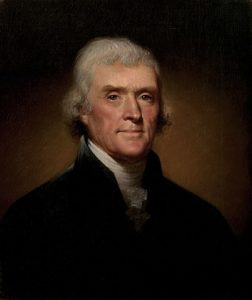Doug Irwin’s great book, Clashing over Commerce: A History of US Trade Policy (which I reviewed in last winter’s issue of Regulation) contains 17 fascinating pages on the Jefferson trade embargo of 1808-1809. President Jefferson apparently believed that, in order to persuade the British government, at war against France, to stop interfering with American merchant ships, the only alternative besides actual war a total trade embargo.

All American ships were forbidden to sail to foreign ports and all foreign ships were forbidden to load merchandise in American ports. Foreign ships could only deliver imports. Note in passing how this distinction confirms, as anybody versed in trade theory knows, that imports are more important than exports: if the alternative is between no imports in or no exports out, the former would be the worst. However, the fact that foreign ships would have had to return empty made such inbound shipments of imported goods rare during the 1808-1809 embargo.
Irwin explains that the embargo amounted to
a stop to all foreign trade. The ostensible reason for doing so was to protect the country’s ships and sailors from British and French encroachments and deprive the belligerents of American goods, forcing them to change their policies.
In order to control smuggling, which spread as time passed, the measures of “peaceable coercion” were gradually strengthened up to the point where no American ship could leave port, even for coastal trade, without official clearance; exports over land were forbidden to prevent overseas exports via Canada; all ships could be searched and detained at will, in clear violation of the Fourth Amendment. And American ships could of course be fined or seized if found in violation of the embargo.
Jefferson could not understand that Americans would disobey. He believed the embargo was only “a temporary evil” and instructed his Treasury Secretary, Albert Gallatin, to “crush every example of forcible opposition to the law.” In May 1808, he wrote to Gallatin:
The numerous and bold evasions of the several embargo laws threatened altogether to defeat the great and interesting objects for which they were adopted, and principally under cover of the coasting trade. Congress, therefore, finding insufficient all attempts to bind unprincipled adventurers by general rules, at length gave a discretionary power to detain absolutely all vessels suspected of intentions to evade the embargo laws, wheresoever found. In order to give to this law the effect it intended, we find it necessary to consider every vessel suspicious which has on board any articles of domestic produce in demand in foreign markets, and most especially provisions.
In other words, since the rule of law did not work, let’s use the rule of men.
This was from the man who, 20 years earlier, had written that “a little revolution now and then is a good thing” (letter to James Madison), as well as the fiery words:
What country can preserve it’s [sic] liberties if their rulers are not warned from time to time that their people preserve the spirit of resistance? let them take arms. the remedy is to set them right as to facts, pardon & pacify them. what signify a few lives lost in a century or two? the tree of liberty must be refreshed from time to time with the blood of patriots & tyrants. (Thomas Jefferson to William Stephen Smith)
It seems that becoming part of the state corrupts the best civil libertarian. Gallatin (who was born in Switzerland and apparently had a French accent—my apologies for the factoids) was not very keen on these “odious and arbitrary measures,” but he obeyed. If you are at the helm of the state, the interests of the state suddenly become the public interest.
In a sense, the free trader is a traitor. He does not want his import or export activity to be controlled, including by his own government. He seems to think, strangely enough, that these are matters of individual not collective choice.
There is another way in which the free trader is a traitor. If his own government imposes tariffs, increasing the price of what he buys, he may very well wish that foreign governments will increase their own tariffs, and that this foreign retaliation will force his own government to back off. Foreign governments can act as a restraint on one’s own government. To take a current example, if you are an American free trader, you will wish that foreign governments will retaliate against Donald Trump’s tariffs if you think that this will force him to backtrack. And a liberal-minded citizen of a foreign country would similarly wish that the U.S. government retaliate against his own government’s protectionist measures. Of course, one would not make these traitor’s wishes if a trade war is likely to follow foreign retaliation.
But there is another way to see all this: the free trader is not a traitor when his wishes or actions (smuggling, for example) work towards constraining his own government and protecting his fellow citizens’ liberty. He is producing the public good of resistance to tyranny.
Facing much resistance from impoverished and disobedient Americans and even from some state governments, Congress finally lifted the embargo in February 1809. It had lasted 14 months. No concessions were obtained from the British government.


Comments are closed.